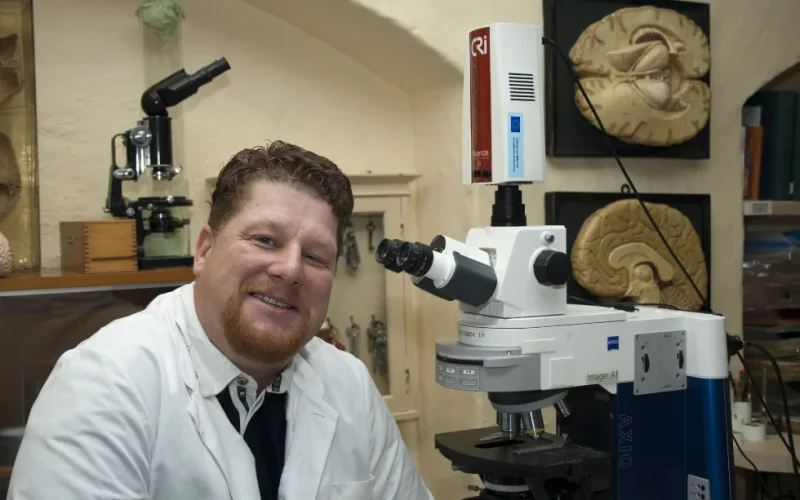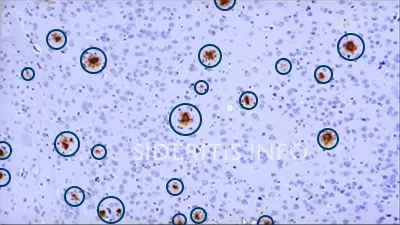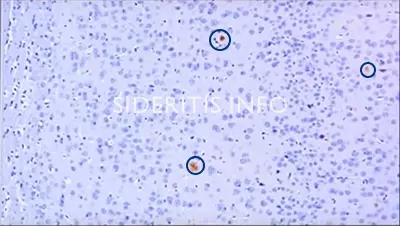Alzheimer`s research
Reading Time: 5 minutes

Table of contents
Improving the condition of Alzheimer's patients
Professor Pahnke has been researching transport molecules in the brain and plant substances that activate these molecules for years. Transport molecules (ABC transporters) are responsible for cleaning the brain. If they are impaired, increased deposits (plaque) can occur.
During his research, he succeeded in significantly reducing plaque deposits in the brain with special extractions of St. John’s wort and Greek mountain tea. The positive feedback from Alzheimer’s patients and their families is amazing.
“We also had cases where patients who no longer communicated with their relatives expressed themselves verbally again. Among other things, we restored communication with his mother for a colleague from southern Germany. He was very pleased about it.”
Professor Pahnke
Like all current treatment methods, these plant substances cannot cure Alzheimer’s either. However, according to Professor Pahnke, they can reverse cognitive impairments that have occurred in the last 6 to 9 months and keep the condition stable for a certain period. The progression of the disease is delayed.
Normalization of everyday life = better quality of life
For Alzheimer’s patients and their relatives, this means considerable relief in everyday life. Communication and, thus, interactions could be improved. The patients were generally more active again, their radius of action increased, and their fine motor skills enhanced. After 2 to 3 months, whether the combination therapy is working can be determined. Unfortunately, this was not the case for all patients.
Reduce the precursor of plaque deposits in the brain
So far, Alzheimer’s research has held amyloid plaque deposits responsible for the disease. However, Prof. Pahnke points out that the amount of deposits is not decisive. Instead, he blames the precursors (fragments) of the plaque for damaging nerve cells. Removing these beta-amyloid fragments was the focus of further research with herbal remedies.
Professor Pahnke investigated whether and how the molecules responsible for transport can be activated. He achieved the best results with special extractions of St. John’s wort and Greek mountain tea. The particular 80% ethanolic extraction (St. John’s wort) or 40% ethanolic extraction (Greek mountain tea) is essential. Lower concentrations are ineffective.
Report on Research Results
Study: Greek mountain tea extract
Press release University of Magdeburg v. 9.12.2013 regarding St. John‘s wort extracts
“In the current scientific work, they can show that, in contrast to the 60% extracts often used in the treatment of depression, the 80% extracts significantly reduce both the soluble and the insoluble aggregates of the toxic Alzheimer’s protein beta-amyloid (up to -50%). This reduction also led to an improvement in memory and orientation functions. The basis of this improvement was not only the reduction of toxic deposits but also the restoration of the number of nerve cells to the level of healthy people.”
Before use
The typical Alzheimer’s plaque deposits are well recognizable in the mouse brain as small brown dots (encircled).

After use
After 50 days of treatment with Greek mountain tea extract (Sideritis scardica), the plaque deposits decreased by 80 percent.

More on plaque deposits in the brain
How are deposits formed in Alzheimer’s disease?
The amyloid precursor protein can be cleaved by two enzymes (γ-secretase and β-secretase). This creates a small fragment that can aggregate and eventually end up in large aggregates – the amyloid plaques.
These small precursors of amyloid plaques, the Αβ peptides, can flow through the brain matter between the neurons and prevent the formation of new synapses.
Use in humans
Recent studies on humans show, according to Professor Pahnke, that the effect can also be verified in persons affected by Alzheimer’s disease. There are several patient replies on Prof. Pahnkes Website. You can read there:
She had severe memory problems […]. The long-term memory was not working; […] She was running away the whole day and wanted to return to the old apartment that had long ceased to exist. She was saying things that she imagined could be classified as delusional. […] By taking Renovare 500, her condition has improved rapidly. […] She gets dressed again independently and usually correctly. The walking and speaking difficulties are gone.
You can find the full version of this reply and many more patient replies here
Watch Prof. Pahnke elucidates the latest treatment
In this video: Fascinating patient feedback from Joy P. Experimentally best effect of extracts from Sideritis scardica and Hypericum perforatum. Recommendation/Dosage for use in dementia. Interaction of St. John’s wort (Hypericum perforatum) with medication. Improvement identified in patients. How important is it to start treatment early? What do patients report?
Based on the research work of Prof. Pahnke, there is currently a product available
Renovare 500
550mg small film-coated tablets, simple administration, active ingredients St. John’s Wort extract and Greek Mountain Tea extract, provider Ceretis, Prof. Pahnke recommends 4 – 6 tablets per day for therapeutic efficacy.
If you want to try taking extracts of Greek Mountain Tea and St. John's wort, you should bear the following in mind:
- In many patients (though not all), clinical improvement (reduction in symptoms) occurred by 6 – 9 months. This means that symptoms that have arisen in the last 6 - 9 months can be reversed. At this stage, patients can be stabilized for the long term.
- According to research, only a stabilization of symptoms can be expected. A cure is currently not possible.
- The studies mentioned are experiments on mice. So far, there have been no studies on humans. Observation of use in patients gives much hope, but no scientific evidence can be derived from this.
- Take at least 900 mg each of the extract of Greek mountain tea and St. John's wort (e.g., Renovare 500 - 4 tablets).
- Test and observe the results of the intake for at least three months.
Everyone reacts differently to herbal ingredients. In most cases, patients have been observed to stabilize. In some patients, the symptoms even improved. However, it is possible that, in some cases, there is no improvement.

